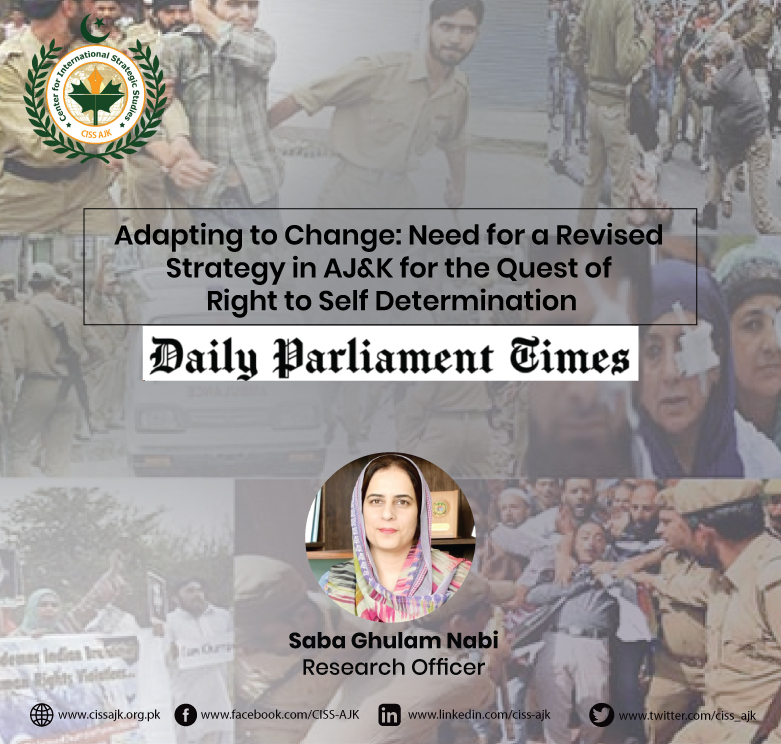621
The 5thof January holds profound significance for the Kashmiri people, as it marks the day when the United Nations took a vital step towards addressing the Kashmir dispute. The resolution set by the UN, emphasizing the need for a plebiscite across Kashmir, stands as a beacon of hope and a testament to the international community’s commitment to a just and democratic resolution of the conflict. This call for self-determination underscores the importance of giving the Kashmiri people the opportunity to express their aspirations through a fair and transparent process. As Kashmiris reflect on this pivotal moment, the resolution remains a guiding principle for those advocating for peace and justice in the region, highlighting the imperative of international cooperation in addressing complex geopolitical issues. Despite Pakistan’s persistent efforts to put international pressure on India to comply with this resolution, the desired outcome has remained elusive. However, over the past 78 years, these resolutions have failed to yield any tangible outcomes or usher in a peaceful resolution to a conflict that has spanned three generations, claiming the lives of more than a hundred thousand individuals in the region. Pakistan has diligently explored every avenue to alleviate the suffering of Kashmiris, providing them an opportunity to peacefully determine their future. From diplomatic channels to engaging in armed conflict over Kashmir, Pakistan has spared no effort in attempting to address this enduring dispute, one that has repeatedly brought two nuclear-armed neighbors to the brink of war. Despite such efforts, India has consistently denied the basic rights of the impoverished Kashmiris, stubbornly resisting any inclination to allow them a voice in determining their fate. India’s approach has been one characterized by the language of power, suppressing any dissenting voices within Kashmir.
Ironically, despite the global commitment to International liberal order and the principles of free will, the international community has been unable to compel India to treat Kashmiris with the bare minimum of humanity. While the Western world and major powers advocate for democracy and human rights, this pseudo-liberalism has proven ineffective in numerous cases, notably in the context of Kashmir. Recently, India escalated tensions further by integrating Kashmir into its territory through the use of force. The Indian Supreme Court’s recent ruling legalized the Indian government’s actions on the 5th of August 2019. India boasts about its success, but in the disputed region of Indian Illegally Occupied Jammu and Kashmir (IIOJK), a solemn silence prevails. India’s claims of “so-called normalcy” stand debunked by frequent reports of encounters, reflecting the loud and clear dissent of Kashmiris against Indian rule. In a scenario where the people of IIOJK are denied the basic freedom to breathe, let alone speak for themselves and their rights, the question arises: who bears the responsibility of speaking and advocating for them? While Pakistan has exhausted every conceivable means to find a resolution, India’s obstinate attitude renders all efforts akin to “banging the head against a brick wall. Over the 77 years following the resolution advocating for a plebiscite in Kashmir, disappointingly no progress has materialized in the resolution of the conflict. In light of this prolonged impasse, the responsibility now squarely rests upon the Govt and people of Azad Jammu and Kashmir to reconsider and reshape their approach. The government of AJK must undertake a comprehensive reevaluation of its strategy, recognizing the need for innovative and impactful initiatives that can capture the attention of the global community.
Despite being a mere drop in the vast ocean of geopolitical power, AJK has the potential to become a drop of ink capable of rewriting the destiny of the nation if guided appropriately. The Karachi Agreement, which delineates the relationship between AJK and Pakistan, places the responsibility of international correspondence on Pakistan, while AJK is tasked with the administration and the propagation of the Kashmir case within Pakistan. However, it is imperative to reevaluate this, by providing Kashmiris the opportunity to voice their concerns on international forums. Moreover, there is a pressing need for capacity-building initiatives in AJK to empower its people, especially youth with knowledge and diplomatic skills, enabling them to effectively advocate for their cause. Establish specialized leadership programs for Kashmiri youth, providing them with mentorship, training, and exposure to international forums, enhancing their ability to articulate their concerns and aspirations effectively. Additionally, a national consensus on Kashmir policy within Pakistan, possibly through parliamentary acts, is essential to formulate a comprehensive and inclusive policy that addresses the multifaceted dimensions of the Kashmir issue.



